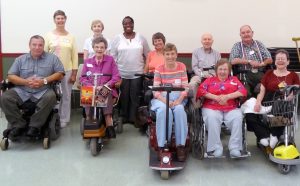The goal of a support group is to empower its members with the tools necessary to make adjustments needed to continue a life of dignity and independence. Contrary to the image sometimes portrayed in the popular media, healthy support groups are not "pity-parties" and do not promote the idea that "misery loves company."
During the original illness, many polio survivors were hospitalized for extended periods of time and established an esprit de corps. After successful rehabilitation, the same survivors lived active, integrated lives. Many of today's successful support groups have rekindled this sense of belonging to a unique group. Also contributing their perspective to support groups, however with some hesitation or even resistance, are individuals who never were a part of a group based on having polio or a disability.
PHI SPARK
Check out PHI's latest resource for support group leaders. These monthly posts seek to provide inspiration and ideas to help keep local groups connected and networking.
Support group(s):
- Share a common health concern.
- Govern themselves and their agenda with success dependent on each member's feelings of ownership.
- May use professionals as resource persons but not as leaders.
- Provide non-judgmental emotional support.
- Gather and share accurate and specialized information.
- Have membership which is fluid; newcomers are helped by veterans and become veterans who may outgrow the need for a group.
- Have a cause and actively promote that cause.
- Increase public awareness and knowledge by sharing their unique and relevant information.
- Charge small or no dues for involvement and typically struggle to survive (Laurie & Headley, 1988).
- Support groups provide a forum for people to learn from each other about how to enhance the quality of their lives (Koop, 1992). Historically, support groups related to a common health condition developed to help people resolve problems with bureaucracies. For this reason, groups are encouraged to operate with minimal structures and rules. Spending excessive time on organizational details detracts from the primary goals of providing personal support and advocating for systems' change.
Successful support groups promote "personal empowerment to overcome personal adversity" (Koop, 1992) by encouraging members to become active, assertive managers of their health care, challenging attitudes of helplessness, hopelessness and victimization. Successful groups create a confidential environment for people to share their feelings safely. Healthy groups balance a time for "me," a time for "us" and time for "you" (Koop, 1992).
Communication is vital in a support group. Members should be encouraged to own their ideas and reactions by using "I" statements, such as "I think ... I feel ... I suggest ..." Participants should avoid speaking for the group without consultation, generalizing by stating, "all polio survivors ...," or telling others what to do, such as "you should ..."
Equally important is listening to whoever is speaking by not interrupting or engaging in cross-talk (Ziegler, 1996). Sometimes distressed members digress on tangents and tell detailed stories rather than staying focused on the topic. To minimize these situations, groups should develop ground rules for the meeting time and recognize the limits of the group's role by encouraging persons who experience continuous or intense distress to seek professional assistance.
Effective leadership is also vital. Many groups function successfully with co-leaders or a committed core team. Effective leaders:
- Acknowledge members' ideas and seek suggestions and feedback.
- Consult with the group about major decisions and respect the group's consensus.
- Request assistance from members.
- Refer to the group as "our" not "my."
- Maintain an atmosphere of respect and order.
- Arrange for reputable, skilled speakers to present topics of interest.
- Obtain and offer names of ethical, knowledgeable professionals and service providers.
- Model self-acceptance and responsibility for their own health and well-being.
- Ensure that individuals who want to speak have an opportunity.
- Respond to the expression of emotion, tension, and conflict openly and with sympathy.
- Offer feedback but avoid authoritative directives by using "I suggest ..." statements, and intervene competently when appropriate.
Survivors join a support group for different reasons, voluntarily attend events and leave the group when they choose.
